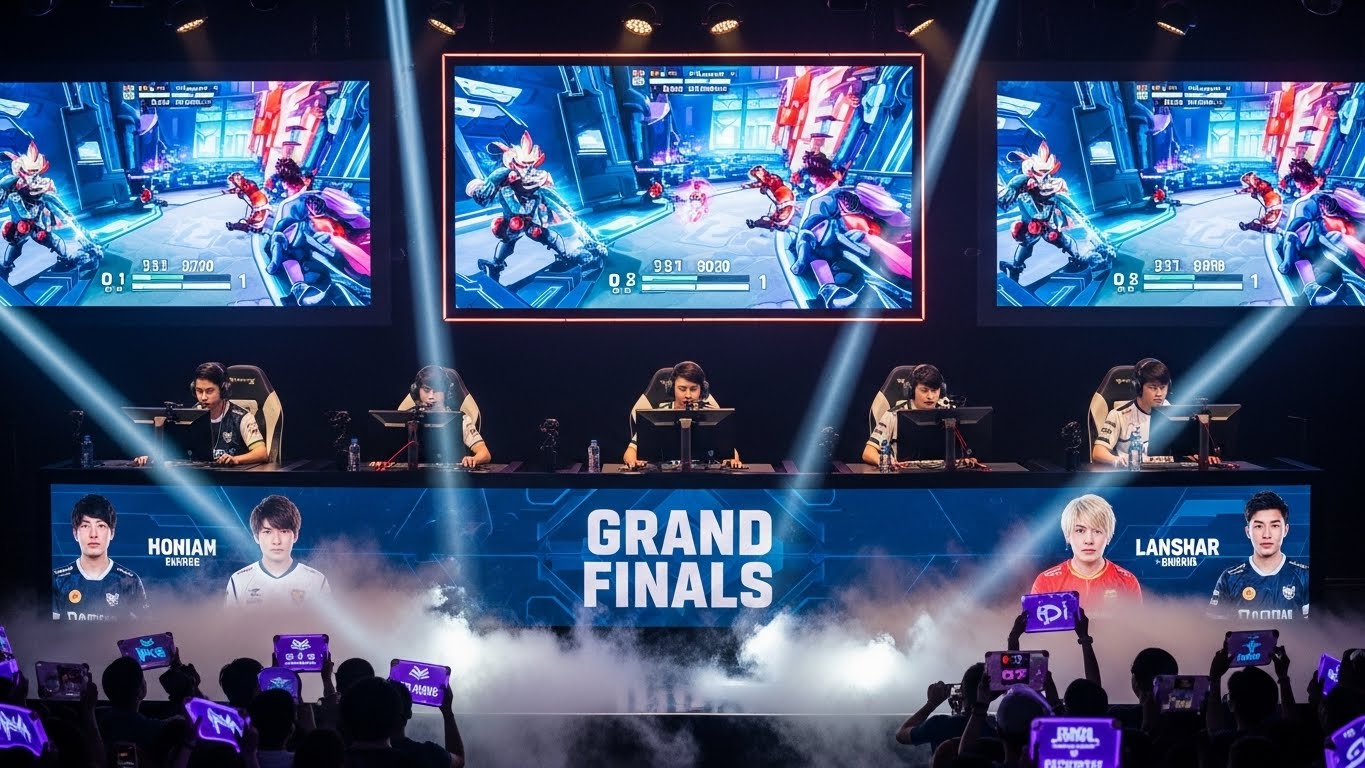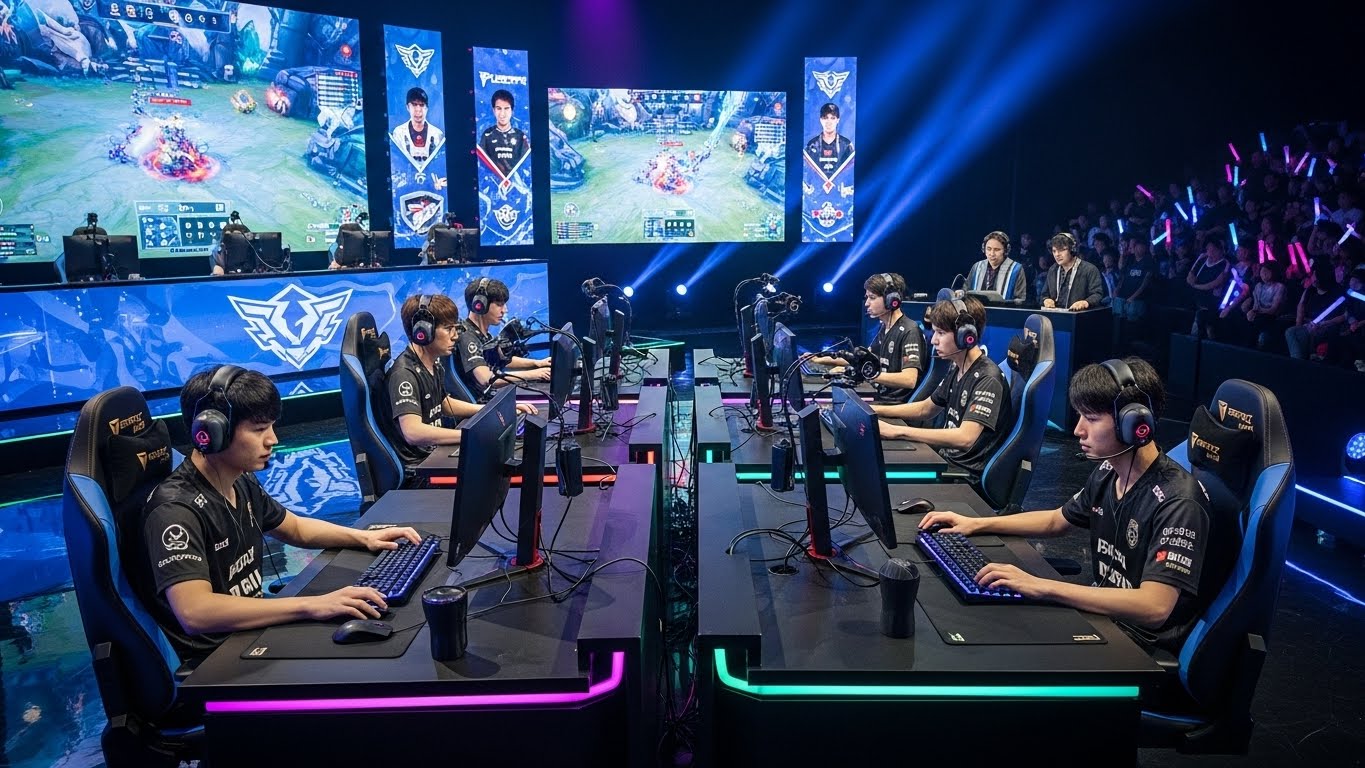Esports has transformed the world of competitive gaming from a small subculture into a multi-billion-dollar global industry. What once began as casual competitions among friends has now evolved into professional leagues, large-scale tournaments, and international fanbases rivaling traditional sports. Esports encompasses a wide variety of games, including strategy, first-person shooters, multiplayer online battle arenas, and sports simulations, attracting millions of players and viewers worldwide.
This blog explores the evolution of esports, the key games and genres that dominate the scene, the economic and cultural impact of competitive gaming, and the future trajectory of this dynamic industry. It also examines the psychological, social, and technological factors that contribute to the growth and popularity of esports.
The Evolution of Esports
Esports traces its origins to the early 1970s and 1980s, when arcade competitions and home console tournaments became popular. Games like Space Invaders, Pac-Man, and later Street Fighter laid the groundwork for competitive gaming, encouraging players to challenge each other for high scores or local dominance. The advent of the internet in the 1990s opened new possibilities, allowing gamers to compete across cities, countries, and eventually continents.
The late 1990s and early 2000s saw the rise of games such as StarCraft, Counter-Strike, and Warcraft III, which became staples of competitive gaming. Organized leagues and international tournaments emerged, and the concept of professional gamers began to take shape. Platforms like MLG (Major League Gaming) in North America and the World Cyber Games provided structured competition, bringing visibility and legitimacy to esports.
By the 2010s, streaming platforms like Twitch revolutionized the industry, enabling fans to watch live gameplay, interact with players, and participate in online communities. Esports shifted from niche gatherings to mainstream entertainment, attracting sponsorships, media coverage, and substantial prize pools. Today, esports is a global phenomenon, with millions of players, hundreds of professional teams, and viewers numbering in the tens of millions.
Popular Esports Genres and Games
Esports encompasses multiple genres, each with unique mechanics, strategies, and fanbases. The most prominent categories include:
Multiplayer Online Battle Arenas (MOBAs): Games like League of Legends and Dota 2 dominate this genre. Players control a single character on a team, aiming to destroy the opposing team’s base while coordinating strategies, managing resources, and outplaying opponents. MOBAs emphasize teamwork, strategy, and decision-making under pressure.
First-Person Shooters (FPS): FPS games such as Counter-Strike: Global Offensive, Call of Duty, and Overwatch involve direct combat from a first-person perspective. Precision, reflexes, map awareness, and coordination are critical, making FPS games highly competitive and fast-paced.
Battle Royale Games: Titles like Fortnite, PUBG, and Apex Legends popularized the battle royale format, where players compete to be the last person or team standing in a shrinking game arena. These games combine strategy, survival skills, and combat, offering a dynamic and unpredictable competitive experience.
Sports Simulations: FIFA, NBA 2K, and Madden NFL bring traditional sports into the digital arena. These games attract both fans of physical sports and competitive gamers, bridging the gap between esports and mainstream athletic fandoms.
Fighting Games: Street Fighter, Tekken, and Super Smash Bros. represent the fighting game community (FGC). Matches are one-on-one battles where timing, reflexes, and combos determine the winner. Fighting games maintain a passionate competitive scene with dedicated tournaments and grassroots communities.
Each genre attracts distinct audiences and requires specialized skills, contributing to the diversity and richness of the esports ecosystem.
The Economic Impact of Esports
Esports has developed into a multi-billion-dollar industry with multiple revenue streams. Prize money for professional tournaments often reaches millions of dollars, drawing elite players and teams from around the world. Sponsors, advertisers, and streaming platforms contribute significantly to the industry’s financial growth. Brands recognize the value of reaching the highly engaged, predominantly younger esports audience, leading to lucrative sponsorship deals and cross-promotional opportunities.
Merchandising and ticket sales also play a crucial role. Major esports events are held in arenas, convention centers, and stadiums, attracting live audiences and generating revenue comparable to traditional sports. Teams sell branded apparel, digital collectibles, and in-game items to strengthen fan loyalty and diversify income streams.
Esports also fuels job creation beyond players. Analysts, coaches, event organizers, content creators, marketing specialists, and broadcasters form a supporting ecosystem that sustains the industry. This growing job market demonstrates esports’ economic influence and its ability to create career opportunities within digital entertainment.
The Role of Streaming Platforms
Streaming platforms like Twitch, YouTube Gaming, and Facebook Gaming have been pivotal in the rise of esports. Live streaming allows fans to watch professional matches, follow their favorite players, and engage with communities in real-time. Interactive features, such as live chat, emotes, and donation systems, create a sense of participation and social connection.
Streaming has also lowered barriers to entry for aspiring players. Amateur gamers can showcase their skills, build followings, and even attract sponsorships or invitations to professional teams. Content creation, including tutorials, highlights, and commentary, contributes to esports culture while expanding the industry’s reach.
The symbiotic relationship between streaming and esports has transformed viewership habits. Fans are no longer passive spectators; they actively engage, discuss strategies, and participate in fan-driven communities, strengthening the sense of belonging and loyalty within the esports ecosystem.
Psychological Benefits and Challenges of Esports
Esports offers numerous psychological benefits, including cognitive development, strategic thinking, and social connection. Players develop hand-eye coordination, multitasking skills, and decision-making abilities. The strategic complexity of many esports titles encourages problem-solving, adaptability, and teamwork.
Socially, esports fosters friendships, mentorship, and collaboration. Teams work together to achieve common goals, learning communication, leadership, and conflict resolution. Online communities surrounding esports provide spaces for fans to discuss strategies, share experiences, and participate in competitions, contributing to a sense of belonging.
However, esports also presents challenges. Competitive pressure can lead to stress, burnout, and mental health issues. Professional players often face demanding schedules, intense scrutiny, and the need for peak performance, which can impact physical and emotional well-being. Addressing these challenges requires structured support, including coaching, mental health resources, and balanced training regimens.
Grassroots Esports and Amateur Participation
While professional esports garners media attention, grassroots and amateur participation forms the foundation of the industry. Local tournaments, online leagues, and university esports programs provide opportunities for aspiring players to develop skills, gain recognition, and build competitive experience.
Grassroots esports nurtures talent pipelines, fosters community engagement, and promotes inclusivity. Women’s leagues, LGBTQ+ initiatives, and youth programs expand access to competitive gaming, ensuring diversity and representation within the esports ecosystem. This inclusive approach strengthens the industry’s social impact and broadens its appeal to global audiences.
Esports and Cultural Influence
Esports has a profound cultural impact, influencing entertainment, media, and social behavior. It bridges gaming culture with mainstream media, fashion, music, and lifestyle. Players and teams achieve celebrity status, while tournaments are broadcast on television and online platforms, creating global fan communities.
Esports also fosters cultural exchange. Players and fans from different countries interact, collaborate, and compete, promoting cross-cultural understanding and shared experiences. International tournaments like the League of Legends World Championship and The International attract diverse audiences, creating a global community united by a shared passion for gaming.
The rise of esports has also inspired creative expression. Content creators produce highlight reels, analysis videos, fan art, and memes, enriching gaming culture and enhancing fan engagement. The integration of esports into popular culture reflects its legitimacy as a form of entertainment and social influence.
Education and Career Opportunities in Esports
The growth of esports has extended beyond gameplay into education and professional development. Universities and colleges offer esports programs, providing scholarships, coaching, and training facilities. Academic curricula often cover game strategy, digital marketing, event management, and media production, preparing students for careers within the industry.
Professional esports careers encompass a wide range of roles, including players, coaches, analysts, tournament organizers, content creators, and marketing professionals. The industry’s rapid expansion has created sustainable career paths, proving that esports is a viable profession rather than a casual hobby.
Additionally, skills developed through esports participation—teamwork, communication, strategic thinking, and technical proficiency—are transferable to other fields, enhancing employability and professional growth.
Technology and Innovation in Esports
Technological advancements are integral to the growth of esports. High-performance hardware, low-latency networks, and cloud gaming platforms enable smooth, competitive gameplay. Advanced analytics and artificial intelligence provide insights into player performance, team strategy, and audience engagement.
Virtual reality and augmented reality are also shaping the future of esports. Immersive experiences create new gameplay mechanics, enhance viewer engagement, and expand competitive formats. AI-driven opponents and personalized training programs allow players to refine skills and adapt to evolving competitive environments.
These innovations ensure that esports remains dynamic, technologically sophisticated, and continually engaging for both players and audiences.
The Future of Esports
The future of esports promises continued growth, innovation, and mainstream recognition. Audience numbers are expected to increase globally, while professional leagues and tournaments will expand into new regions. Esports may increasingly intersect with traditional sports, entertainment, and education, further blurring the lines between digital and physical competition.
Technological advancements, including virtual reality, augmented reality, artificial intelligence, and blockchain, will enhance gameplay, fan engagement, and fairness in competition. Cross-platform play and global accessibility will enable more players to participate, fostering inclusivity and diversity.
Esports is likely to become a permanent fixture in entertainment and sports culture, with professional teams, global tournaments, and media coverage rivaling established industries. The integration of technology, culture, and community ensures that esports will continue to evolve and thrive in the coming decades.
Conclusion
Esports has transformed competitive gaming into a global cultural and economic phenomenon. From humble beginnings in arcades and early online competitions, it has grown into a multi-billion-dollar industry encompassing diverse games, professional leagues, and international audiences. Esports offers cognitive, social, and career benefits while also presenting challenges related to mental health, performance pressure, and inclusivity.
The integration of technology, streaming platforms, and community engagement has solidified esports as a legitimate form of entertainment and professional endeavor. Its cultural influence continues to expand, bridging geographic and social boundaries, fostering creativity, and inspiring a new



